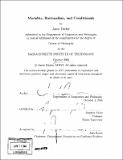| dc.contributor.advisor | Stephen Yablo. | en_US |
| dc.contributor.author | Decker, Jason (Jason Andrew) | en_US |
| dc.contributor.other | Massachusetts Institute of Technology. Dept. of Linguistics and Philosophy. | en_US |
| dc.date.accessioned | 2007-10-22T17:39:14Z | |
| dc.date.available | 2007-10-22T17:39:14Z | |
| dc.date.copyright | 2006 | en_US |
| dc.date.issued | 2007 | en_US |
| dc.identifier.uri | http://hdl.handle.net/1721.1/39344 | |
| dc.description | Thesis (Ph. D.)--Massachusetts Institute of Technology, Dept. of Linguistics and Philosophy, February 2007. | en_US |
| dc.description | Includes bibliographical references (leaves 105-108). | en_US |
| dc.description.abstract | This thesis consists of three interconnected papers on apriority, modality, and conditionals. In "Playground Conditionals," I look at three philosophical debates, each of which turns on the epistemic status of a certain kind of conditional-what I call a playground conditional. I argue that a close consideration of playground conditionals gives us a better appreciation of what we can do with conditionals and, ultimately, some guidance concerning what to say about the three philosophical debates. In "Modal Rationalism, Two Dimensionalism, and our Counteractual Sisters", I consider the prospects for modal rationalism in the wake of Kripke's Naming and Necessity. Recently there has been a modal rationalist revival, thanks in part to the development of the "two-dimensional" semantic framework. This framework associates two intensions (a primary intension and a secondary intension) with every sentence. The difficulty comes in finding a definition of primary and secondary intension that would lend the desired support to modal rationalism. After exploring and rejecting some of the proposed definitions in the literature, I sketch an account that can, I think, offer some support to a suitably framed modal rationalism. | en_US |
| dc.description.abstract | (cont.) Finally, in "A Guide to Modal Guidance," I set about to get clearer on how, exactly, we come to know modal truths. I start by considering two arguments that are designed to show that our access to modal knowledge cannot come from conceivability arguments. I show that, these arguments are mistaken. In the process, I attempt to outline a broader and more realistic modal epistemology than one that focuses exclusively on conceivability. I then consider and reject a version of modal rationalism which says that ideal conceivability gives us a priori access to modality. Against this, I argue that our modal knowledge is predominantly a posteriori, and that our knowledge of ideal conceivability is always a posteriori. In the end, however, I attempt to salvage something that preserves the spirit, if not the letter, of modal rationalism. | en_US |
| dc.description.statementofresponsibility | by Jason Decker. | en_US |
| dc.format.extent | 108 leaves | en_US |
| dc.language.iso | eng | en_US |
| dc.publisher | Massachusetts Institute of Technology | en_US |
| dc.rights | M.I.T. theses are protected by copyright. They may be viewed from this source for any purpose, but reproduction or distribution in any format is prohibited without written permission. See provided URL for inquiries about permission. | en_US |
| dc.rights.uri | http://dspace.mit.edu/handle/1721.1/7582 | |
| dc.subject | Linguistics and Philosophy. | en_US |
| dc.title | Modality, rationalism, and conditionals | en_US |
| dc.type | Thesis | en_US |
| dc.description.degree | Ph.D. | en_US |
| dc.contributor.department | Massachusetts Institute of Technology. Department of Linguistics and Philosophy | |
| dc.identifier.oclc | 173611526 | en_US |
